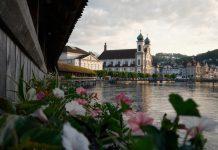The religious aspect of the war that Russia is waging in Ukraine is now more easily observed. Is this a new religion?
Newsroom (04/06/2022 13:00, Gaudium Press) As reported earlier in Gaudium Press, Orthodox Patriarch Kirill of Moscow and Russian President Putin appear to have the same goal of establishing a state-run religion. In recent days the international press has proclaimed the news that the Ukrainian parliament, which continues on in its functions, is seeking to recommend and promote the Russian Orthodox Church in Ukraine.
Indeed, the focus is increasingly on the Orthodox religious phenomenon in Russia, which many have already described as Orthodox Caesaro-papism, that is, a total union of Church and State, over which Putin has near complete control.
Among the many analyses being made these days on this phenomenon, there is one that stands out for its original notes: that of Stefano Caprio in Asianews, entitled “The Catholics of Russia and Ukraine.”
Caprio tells of the persecution of the ‘Uniates‘, a term – somewhat imprecise – referring to the Christian communities of the East that have returned to full communion with Rome, as in the case of the Ukrainian Greek-Catholic Church, which today is led by Msgr. Svyatoslav Shevchuk, Major Archbishop. This account coincides with other historical analyses.
However, it deals with some interesting special features of current Russian Orthodoxy.
Caprio recalls that since the year of the opening of the apostolic nunciature in Moscow and the episcopal appointments of 1991, “there has not been a single case of real conflict between Catholics and Orthodox in Russia over disputes of the faithful or places of worship.” Relations between the faithful and clerics of both parties were more than cordial.
In 2002 however, two years after Putin’s ascension, several Catholic missionaries were expelled from Russia, a “clear stance in defense of Orthodoxy as a ‘state religion‘”. What had happened? “The four Catholic apostolic administrations (Moscow, Saratov, Novosibirsk, and Irkutsk) were elevated by the Holy See to the rank of dioceses, an almost automatic decision after a certain time, and this (imprudent) decision was considered a ‘declaration of war by the Orthodox and nationalists‘.” In other words, there was a new Orthodox nationalist sentiment, previously non-existent, which allowed for a salutary peace.
In this defense of Russian Orthodoxy, the new ruler Putin and his communist predecessors were in full agreement: “[The Russian Orthodox Church] had already been elevated above all other confessions by the law on religious freedom that was reformed in 1997, proposed by the communists and inspired by the Moscow patriarchate,” Caprio said.
This law of religious freedom, which could well be considered the establishment of a state religion, has a very curious, perhaps revealing side.
In the prologue of that law, it was proclaimed that the historic religion of Russia was Orthodox and that there were other “traditional secondary” religions: Islam, Buddhism, and… Christianity. In other words, the Orthodox Church is not an expression of Christianity, no. It is a separate reality.
What is the reality of this phenomenon?
Caprio gives a few brushstrokes that evoke no sympathy from these Orthodox, but which leave those who wish to delve more deeply into this phenomenon left with nagging questions: the “flea behind their ears”, as it were.
“Russian Orthodoxy is, in effect, a distinct spiritual dimension in which Christian dogmas are mixed with pagan remnants much more than in other branches of Christianity and, above all, are recast in national universalist ideals that describe Russia as a ‘salvific people’ for all mankind.”
It is thus, in this analyst’s mind, the expression of a “post-religious ideology”, “which implies an entirely political interpretation of the post-Communism ‘religious revival‘, which has ceased to be a spontaneous search for God and has instead become a revival of the State Church.”
This Orthodox ideology would be “a framework of values and reference principles based on the distinction and rejection of what is called ‘the West‘”, understood as “a space dominated by the degraded spirit of the enemies of the true faith“. This new style of Russian Orthodoxy and its ally Putin would be the ones called to fight against the Antichrist that dominated the West. Putin alone could not have embodied this ideal; he needed a religion to support him, and by all accounts, appears to have found that support in the Russian Orthodox Church.
Are we witnessing the rise of a new religion?
Compiled by Sandra Chisholm


































